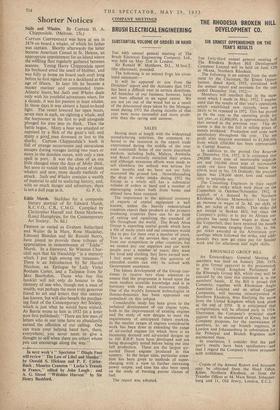Shorter Notices
CAPTAIN CHIPPENDALE was born at sea in 1879 on board a whaler, of which his father was captain. Shortly afterwards the latter became American Consul in St. Helena, an appropriate appointment for an island where the willing fleet regularly gathered between seasons. Young Harry Chippendale spent his boyhood amid the smell of blubber, and was fully at home on board such craft long before he first signed on as a deckhand at the age of fifteen. In later life he became a master mariner and commanded trans- Atlantic liners, but Sails and Whales deals only with his youthful adventures when, for a decade, it was his passion to hunt whales. In those days it was almost a hand-to-hand fight. The vessel lowered her open boats, seven men in each, on sighting a whale, and the harpooner in the first to pull alongside plunged his iron into its flank, Then the battle began. Many a boat was smashed or capsized by a flick of the giant's tail, and many a goodinan drowned or lost to the sharks. Captain Chippendale's book is full of strange occurrences and miraculous escapes during voyages lasting two years or more in the desolate ocean, with only a rare Spell in port. It was the close of an era little changed since the days of Moby Dick, but soon to vanish with the advent of steam " whalers and new, more deadly methods of attack. Sails and Whales contains a wealth of material to add to seafaring history, and, with so much danger and adventure, there


































 Previous page
Previous page